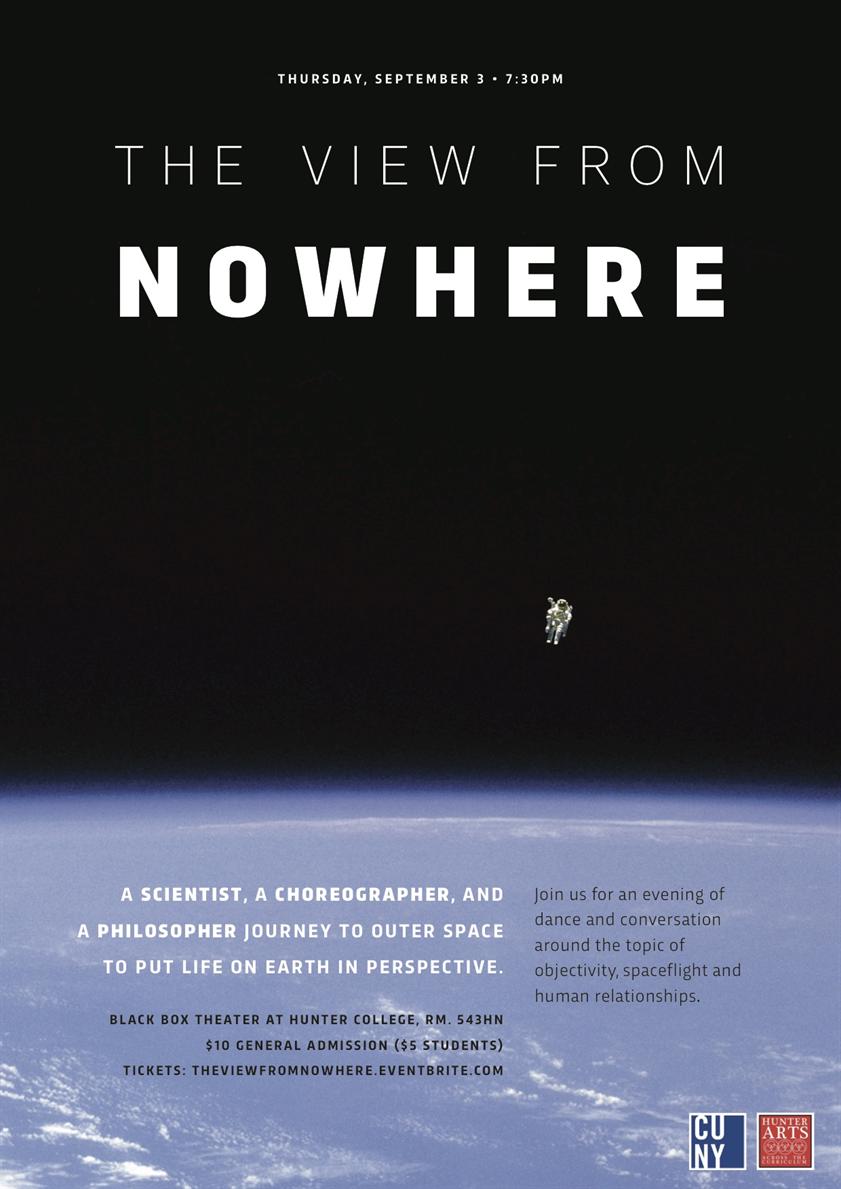This
response relates principally to Julian Barnett’s contribution to “The View from
Nowhere” event hosted at the Hunter College Blackbox Theatre September 3rd,
2015.
“A View
from Nowhere”- “An evening of dance and conversation on space flight,
objectivity, and human nature – this event is inspired by the mind-blowing
themes brought about by the so-called "Overview Effect" experienced
by astronauts.”
A
long time ago, I took Julian Barnett’s Fundamentals of Contemporary class
during my first semester at Hunter College. Having enjoyed practicing his
movement, and being familiar with his artistic work, I was eager to see him in
live performance.
Barnett’s “Bluemarble” centers
on the concept of the “overview effect”
starring himself and Jocelyn Tobias. As the program explains, the
Overview Effect refers to the phenomena in which astronauts who leave space
look back at Earth with an enhanced perspective. Adrift in space, the Earth in
its entirety, literally lies before them. Few people, if any, have the opportunity
to visit the endless expanse of continents and water bodies that make up the
Earth. Yet, in space, astronauts are offered the opportunity to peer at the
Earth from afar and take in its vast complexities along with its relative
smallness in relation to the larger solar system. And from this place of
physical detachment, they experience a sort of emotional detachment that allows
for deeper intellectual understanding of his or her place in the larger
universe.
Following
the “Bluemarble” performance, a Philosophy PhD candidate P.J. Gorre speaks of
the pursuit of truth throughout scientific history. Despite our best attempts
to ensure a subjective world view, science has been influenced by human
ideology. The Overview Effect, in theory, represents a favorable shift in perspective
that illuminates a deeper level of truth regarding our existence. The story of
the astronaut journeying deep into the recesses of space can be seen as a
metaphor for humankind’s pursuit of knowledge. By abandoning the familiar
assumptions that bind us to the ideas we have learned to take forgranted, like
the physics of gravity binds one to Earth, we are able to expand off into the
endless universe and place a critical eye on our place of origin.
The
piece opens up with Barnett signature rapid arm movements that jab the air and
encircle his body. The height contrast between Barnett and his partner was
interesting, despite the similar movement style they shared. From this playful
prancing across the stage, the tone shifts into a much darker place.
Barnett
explodes into a garbled vocalization that mimics some alien form of speech. The
contorted expression of his face along with the convulsions of his upper body
reflect that an uncomfortable transformation is occurring. It is as though he
is bursting at the seams with some powerful, otherworldly force that struggles
to be released from the Earthly body he inhabits. The noises he makes are
unintelligible to the outsider. Possibly, simply, because they lie beyond our
level of understanding.
In
a moment that resembles the Big Bang, in a series of violent outbursts Barnett tosses/bats
small beach balls onto the stage space. Like small planets in a larger solar
system, Barnett and his partner encircle the center of the stage amongst the
scattered balls, reciting the names of countries in the world by continent.
Their soft vocalizations blur the line between song and speech which creates a
hypnotizing effect. We are orbiting around the artists… or they around us.
Regardless, from this circle like audience set up, we are connected to one
another, members of a shared universe.
Our
close proximity to the performers in the Black Box enables a layer of intimacy
unavailable on a proscenium stage.
Barnett exploits this at a particularly poignant moment in which he and
his partner walk slowly across the stage peering into the eyes of audience
members. The audiences spends the whole time prior looking at the dancers… but
Barnett reverses the role and gazes not just at us, but into us. The dancers’
somber, empty expressions along with their long, steady stare imply a sense of
deep outward investigation and understanding regarding who we are as people.
The performance closes with the
couple standing side by side mumbling about the passage of day and night, as
the light dims before cloaking us in a pitch black darkness. The voices fade
into a constant hum that reminds us of the ceaseless passage of time on earth,
and as a consequence the shared mortality we are all bound by.
Julian
Barnett represents the radical shift in perspective that occurs during an
enlightenment through movement and vocalization. The bliss of ignorance. The
pain of awakening. The ensuing confusion. And the eventual peace of mind that
knowledge permits.
A video link of Barnett' work is available through this link.

No comments:
Post a Comment